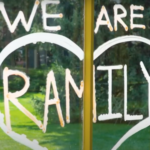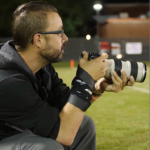By Angela Hayes, Associate Director of Alumni and Online Career Engagement
It’s usually not the event or adversity itself that causes us to be stressed, upset and possibly feel like a fraud, it’s our interpretation of the event. It’s almost always about the stories we tell ourselves about what happened – our own unique interpretation. Beliefs matter because they shape the quality and intensity of your feelings and influence how you behave as a result: what you do in the moment. This is important because strong, confident people are able to regulate their emotions and control their reactions so that they respond in the best way to any given situation. The goal isn’t to be in a great mood all the time. The goal is for our emotions and behaviors to be productive, appropriate responses to the facts of the situation, instead of knee-jerk reactions to whatever beliefs happen to be rolling through our heads.
Learn the ABCs
An easy way to think of it is this A stands for the adversity you experience. Adversities are events that lead to our reactions. They can be big, like losing a job or small like missing a minor deadline or being a few minutes late for a meeting. Most of us think of adversity as leading directly to emotional and behavioral consequences – what we feel and do in response to the thing that happened. It’s like it goes from A to C. Adversity to Consequences. When something good happens, we experience positive emotions and when something bad happens we experience negative emotions. It seems logical, but it’s not accurate. It’s not the event itself that causes emotions, it’s our thoughts and beliefs about what just happened that causes our emotions and subsequent behaviors. It’s the story we tell ourselves about what just happened.
Let’s look at an example. You are in a meeting in which you haven’t said anything. You feel like an imposter in these meetings. You very rarely say anything because you don’t want to say something that will prove you don’t know what you’re doing. However, the topic being discussed is something that you know a lot about and you decide to give your feedback and ideas. It seems worth the risk because it’s something the company has been struggling with for a long time. After you’ve spoken, there is dead silence in the room. Everyone is staring at you and they seem stunned. It feels like hours go by, but it’s actually been about two seconds. You realize that you’ve made a big mistake and excuse yourself, saying you don’t feel well, just as your supervisor begins to speak. She’s smiling (or is she laughing? Maybe that’s more likely) Why did you leave the meeting? What are some likely things that were going through your head? Some examples could be: They think I’m an idiot. How could I have blurted that out like that? Why didn’t I think it through? I need to come up with a reason not to attend this meeting next week because they’ll probably still be thinking about it then. I can’t stand the thought of the humiliation. Now think through what might have actually just happened. Why are they looking at you in stunned silence?
For now, let’s think about how two different people might react to that stunned silence in the room. We’ve already talked about the one who runs from the room. How about the one who stays. What might they be thinking? “They can’t wrap their heads around the depths of my brilliance. They are thinking through all of the positive outcomes of my ideas. I’m a rock star.”
So is it the adversity itself that causes the consequences/reactions? No. It’s the thoughts and beliefs about what just happened.
Most people will tell me, well I can’t control what I think. Yes, you can. You can fight back. You can say no to the inner critic. You can just change the channel if you don’t like what you’re hearing inside your head. You can do things to distract yourself. And exerting this control will make an unbelievable amount of difference in your level of confidence and resilience. People can have vastly different responses to the same incident. In fact, some wouldn’t see it as an incident at all, or might not even notice that it happened. Why not decide to see the situation in a way that is in your favor? I can promise you that it won’t be any more outlandish than the negative stories you are telling yourself. Because we are wired to see what’s wrong in a given situation. Noticing what’s wrong and focusing on it is part of what kept us alive on the planet. But telling a story that’s in your favor is very likely to be much closer to the truth.
Buy into Belief
So it’s important to look at that B – C Connection: When something happens and you have a reaction/emotional response, stop and think about what beliefs or thoughts came just before that emotional reaction. Then think again about what happened as objectively as possible, like you were recording it with a video camera. Think: Is there another way to look at the situation? Then figure out the B. What beliefs or thoughts did you have that led to your feelings and actions? There is a learning curve here. It takes practice, but I promise you it’s worth the effort. You can look for patterns and start gathering facts about the things that upset you. Is the way you were looking at the situation true? Are you sure it’s completely true? Would someone else see it just the same way?
Of course there are situations where our thoughts and beliefs don’t really matter because the events are so severe that our reactions are driven by the event itself – like the loss of a loved one or other tragedies. In these cases the emotions and actions are from the tragedy itself, not our interpretation of it. Later on, how quickly we do or don’t bounce back, to the extent that we can, will be dependent on the stories we keep telling ourselves about the tragedy.

ANGELA HAYES serves as the Associate Director of Alumni and Online Career Engagement. Prior to coming to CSU, she worked as the Assistant Director of Alumni and Graduate Student Career Services at Kansas State University. She has a B.S. in psychology, an M.S. in industrial/organizational psychology and a Ph.D. in professional coaching and human development. She’s a nationally Board Certified Coach and a nationally Certified Health and Wellness Coach.
She has a passion for helping others to see their lives as full of possibilities and un-tapped potential. She views changes/transitions (both planned and unplanned) as opportunities for individuals to discover and plan out what they really want from their careers and lives.


































































